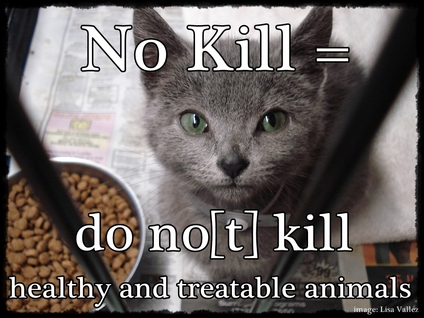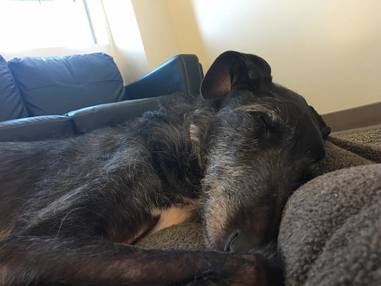|
There is a lot of talk these days about the phrase "no kill." It is much misunderstood and it makes a lot of people uncomfortable. There are those who say we should not use the phrase because it is divisive or because it offends people. Some would tell you that no kill is not possible or that it is irresponsible. Others say that we should use the phrase "low kill" instead. I'm not entirely sure what that even means. Some who oppose no kill philosophies use the phrase as a weapon to try to discredit a social movement which is changing our country, whether they like it or not. Yet others toss the phrase around and apply it to situations which have nothing to do with true no kill philosophies. I saw a story on the news last night from my area in which the phrase no kill was used inaccurately and this leads to my blog of today. This is what "no kill" means - and does not mean - to me. If you do not agree, that's perfectly fine. I'm writing this to bring some clarity to the subject for those who really have no idea what the rest of us are talking about. For an in-depth look at the phrase, I encourage anyone reading my blog to read this publication by the No Kill Advocacy Center called "Defining No Kill." No kill is a culture in which healthy and treatable animals are not destroyed in our shelters for space, convenience or following some tradition using our tax dollars or donations. In this culture, the only animals destroyed are those who are suffering, are irremediably ill or dogs who are so genuinely aggressive (as opposed to scared or traumatized) that they are unsafe to have in our communities (and for which no sanctuary placement is available).
No kill is not a definition. It does not mean that no animals ever die. To keep animals alive when they are truly suffering or are so genuinely broken that they present a danger to the public would be unethical and irresponsible. No kill is a philosophy which says the lives of all companion animals have value and that those animals must be treated as individuals, worthy of our time and attention to keep them alive. In this philosophy, homeless animals are treated as either having been someone's beloved companion or being capable of being that companion. They are essentially given the benefit of the doubt, treated as adoptable and not blamed for the fact that they need our help. No kill is not about simply keeping animals alive, regardless of the conditions in which they live. It does not allow animals' physical, psychological or emotional well-being to be compromised just so we can say "they are alive and we did not destroy them." No kill is about programs which function in concert with each other to both reduce shelter intake and to increase shelter output so that animals spend the least amount of time possible in an institutional setting. When animals are boarded for undefined periods of time, that is not no kill. That is a situation which is simply not sustainable financially. It can also cause animals to become so accustomed to living in a kennel environment that they are ill-prepared for the stimulation of life outside of the kennel. When animals are collected on rural properties out of the knowledge and view of the public and law enforcement authorities, that is not no kill. That is essentially collecting and more often than not it also involves neglect and abuse. When animals are kept at a "sanctuary" which does not function within its financial and physical ability to properly care for and then place those animals, that is not no kill. Overwhelmed sanctuaries are little more than animal prisons where the animals and the people caring for them are under incredible amounts of stress, often leading to disaster. No kill is about values and hope and compassion and about doing our very best for companion animals because we care about them and we want the very best for them. I understand that there are a lot of people out there doing a lot of great things to try to help animals and keep them alive. I think that any person who genuinely means well in their efforts to help animals should be commended. But with those efforts comes a responsibility to learn how to best care for those animals while avoiding a situation where the people essentially "flame out" - or are arrested- and we are left with a crisis situation where large numbers of animals have to be placed in very short periods of time. If you would like to learn more about no kill philosophies and about what the phrase really means, please educate yourself by doing some homework and by networking with people in no kill communities. You may say that you don't have time for that. I say you have to make time. The lives of companion animals depend upon you being not just a passionate advocate but an informed advocate.
0 Comments
When the singer's gone, let the song go on. It's a fine line between the darkness and the dawn. They say in the darkest night, there's a light beyond. But the ending always comes at last. Endings always come too fast. They come too fast, but they pass too slow I love you and that's all I know. - Art Garfunkel A friend of mine said farewell to her beloved dog last week. Rawley had a sarcoma. He survived the surgery, but went into respiratory distress two days later. It's thought that he threw a blood clot. He was getting the very best of care and his family was there to make sure his departure was peaceful.
I cried when I heard the news. I know that makes little sense to many people. He was not my dog and I never met him. He was my friend's beloved boy and because I understood her grief, I developed what I call empathy grief from thousands of miles away. What I felt and still feel pales in comparison to the heartache I know she is enduring, but between myself and others, there is this sense of community loss for a single dog. I think that for those of us who have shared incredible bonds with our companion animals, the loss felt by another person just takes us back to our own losses. We relive that feeling of helplessness as we try to do or say something, anything that might help. To my friend, I truly am so very sorry for your loss. To Rawley, I am so very sorry you could not stay. I am sure you had a wonderful life here and I just wish it could have been longer. I spent a lot of time just staring at my own dog in the wake of Rawley's passing. Our dog had a stroke in early September and it's a miracle that he's still with us. His days are surely numbered and I really do my best each and every day to be thankful for the blessing of his presence in our lives. A day will come when we too have to say farewell and there will be nothing we can do to keep him here. And I know my friends will feel that empathy grief for his passing. When I think of the complete anguish over losing a beloved pet that I have felt and which I know is felt by people like my friend, it brings home to me the tragedy that is loss of life in our nation's animal “shelters.” Thinking back, pretty much every animal I've ever loved and lost would have been destroyed in a traditional animal shelter and while it is tragic that their lives are so short even with the best of health, the true tragedy would have been if their lives had been ended for no reason at all. Each and every day perfectly healthy and treatable animals are destroyed in shelters using our tax dollars for no other reasons than they happen to be in the wrong place at the wrong time and we have failed to end the outdated practice of killing them. We like to think that ours is a great country in terms of our lifestyle and our values. I think we can never really consider ourselves a great country until we stop being hypocrites. We cannot possibly say that we are animal friendly as a nation while we continue to spend countless tax dollars each year destroying the very creatures we say we love. It just doesn't make any sense. Rawley mattered. Rawley was much beloved. And he is much missed not only by his own family but by people like me who never met him. Each and every shelter dog in America deserves the same. They matter. They too could be much beloved and much missed when the time comes when they can no longer stay here. But that time should come as the result of old age or incurable disease and not at our hands. Only when we end the public shame which is our sheltering system will we be able to call ours a truly animal friendly nation. That's all I know. |
AuthorI am an animal welfare advocate. My goal is to help people understand some basic issues related to companion animals in America. Awareness leads to education leads to action leads to change. Archives
July 2024
Categories
All
image courtesy of Terrah Johnson
|


 RSS Feed
RSS Feed